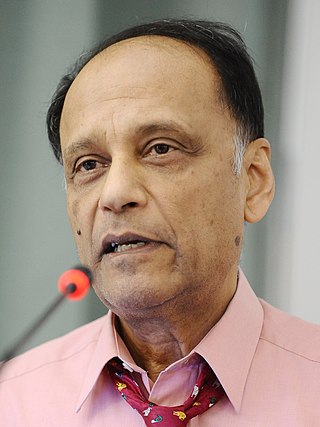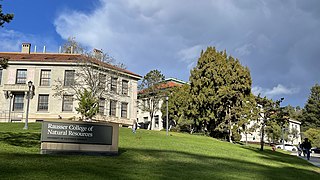Frederick Howard Buttel was the William H. Sewell Professor of Rural Sociology at the University of Wisconsin–Madison. A prominent scholar of the sociology of agriculture, Buttel was well known also for his contributions to environmental sociology.

Aldo Leopold was an American writer, philosopher, naturalist, scientist, ecologist, forester, conservationist, and environmentalist. He was a professor at the University of Wisconsin and is best known for his book A Sand County Almanac (1949), which has been translated into fourteen languages and has sold more than two million copies.
Agricultural economics is an applied field of economics concerned with the application of economic theory in optimizing the production and distribution of food and fiber products. Agricultural economics began as a branch of economics that specifically dealt with land usage. It focused on maximizing the crop yield while maintaining a good soil ecosystem. Throughout the 20th century the discipline expanded and the current scope of the discipline is much broader. Agricultural economics today includes a variety of applied areas, having considerable overlap with conventional economics. Agricultural economists have made substantial contributions to research in economics, econometrics, development economics, and environmental economics. Agricultural economics influences food policy, agricultural policy, and environmental policy.

Sir Partha Sarathi Dasgupta is an Indian-British economist who is Frank Ramsey Professor Emeritus of Economics at the University of Cambridge, United Kingdom, and a fellow of St John's College, Cambridge.

The Wisconsin Department of Natural Resources (WDNR) is a government agency of the U.S. state of Wisconsin charged with conserving and managing Wisconsin's natural resources. The Wisconsin Natural Resources Board has the authority to set policy for the WDNR. The WDNR is led by the Secretary, who is appointed by the Governor of Wisconsin. The WDNR develops regulations and guidance in accordance with laws passed by the Wisconsin Legislature. It administers wildlife, fish, forests, endangered resources, air, water, waste, and other issues related to natural resources. The central office of the WDNR is located in downtown Madison, near the state capitol.
The Journal of Environmental Economics and Management is a peer-reviewed academic journal of environmental economics published six times per year. It was the official journal of the Association of Environmental and Resource Economists until 2014 and publishes theoretical and empirical papers concerned with the linkage between economic systems and environmental and natural resources. When it was the official journal of the Association of Environmental and Resource Economists, the journal was generally regarded as the top journal in natural resources and environmental economics. Ralph d'Arge and Allen V. Kneese were the founding editors. The current editors-in-chief are Roger von Haefen and Andreas Lange. Previous editors include Till Requate, Daniel J. Phaneuf, Joseph Herriges, and Charles F. Mason.

Daniel W. Bromley is an economist, the former Anderson-Bascom Professor of applied economics at the University of Wisconsin–Madison, and since 2009, Emeritus Professor. His research in institutional economics explains the foundations of property rights, natural resources and the environment; and economic development. He has been editor of the journal Land Economics since 1974.

Norman Irving Wengert was an American political scientist who wrote about the politics of natural resources, advanced a seminal theory of the "politics of getting", and had a number of significant roles in his public and academic career. He was born in Milwaukee, Wisconsin to Eugene F. and Lydia Semmann Wengert. He pioneered the revival of the study of political economy in the United States with publication of Natural Resources and the Political Struggle, and later authored more than fifty monographs and studies on the political economy and public administration of environmental resources. His scholarship explored the politics of natural resources and environmental policy formation and administration, with emphases in national energy policy, urban water planning and management, land use planning and controls, national forest management, and citizen participation in administrative processes.
The School of Human Ecology is a school at the University of Wisconsin in Madison, Wisconsin. The school has both graduate and undergraduate programs. The departments are Consumer Science, Design Studies, Civil Society & Community Studies, and Human Development & Family Studies. The school has more than 2,400 undergraduates working towards majors, and 100 graduate students.

Burton A. Weisbrod is an American economist who pioneered the theory of option value, and the theory of why voluntary nonprofit organizations exist, He also developed the methodology for valuing voluntary labor. He advanced methods for benefit-cost analysis of public policy by recognizing the roles of externality effects and collective public goods in program evaluation. He applied those methods to the fields of education, health care, poverty, public interest law, and nonprofit organization. Over a career of fifty years, he published 16 books and over 200 scholarly articles. He is currently the Cardiss Collins Professor of Economics Emeritus and a Fellow of the Institute for Policy Research at Northwestern University.

Philip Howard Lewis Jr. was an emeritus professor of landscape architecture who promoted the "environmental corridor" concept. He taught for more than 40 years at the University of Illinois (1953–1963) and the University of Wisconsin–Madison (1964–1994). Charles Little, author of Greenways for America, describes Lewis as the "...most inventive figure in regional landscape planning theory in the country".

David Zilberman is an Israeli-American agricultural economist, professor and Robinson Chair in the Department of Agricultural and Resource Economics at the University of California, Berkeley. Zilberman has been a professor in the Agricultural and Resource Economics Department at UC Berkeley since 1979. His research has covered a range of fields including the economics of production technology and risk in agriculture, agricultural and environmental policy, marketing and more recently the economics of climate change, biofuel and biotechnology. He won the 2019 Wolf Prize in Agriculture, was the President of the Agricultural and Applied Economics Association (AAEA), and is a Fellow of the AAEA and Association of Environmental and Resource Economics. David is an avid blogger on the Berkeley Blog and a life-long Golden State Warriors fan.
John D. Aber is University Professor Emeritus of Natural Resources & the Environment at the University of New Hampshire, and was also for many years affiliated with the Institute for the Study of Earth, Oceans, and Space at UNH. His fields of study included Ecosystem Analysis and Modeling, Global Change, Acid Rain, Nitrogen Deposition and Sustainable Agriculture.
Steven Neil Durlauf is an American social scientist and economist. He is currently Steans Professor in Educational Policy at the Harris School of Public Policy Studies at the University of Chicago. Durlauf was previously the William F. Vilas Research Professor and Kenneth J. Arrow Professor of Economics at the University of Wisconsin-Madison. As of 2021, is also a Part Time Professor at the New Economic School.
Thomas Harry (Tom) Tietenberg is an American economist and environmentalist, and Emeritus Professor at Colby College, known for his work in the field of resource-based economy.
Jean Marie Bahr is a hydrogeologist who examines how the physical and chemical composition of groundwater and how that controls the mass transportation of groundwater. She currently is an Emeritus Professor at the University of Wisconsin Madison in the department of geosciences.
Carlisle Ford Runge is a professor of applied economics and law at the University of Minnesota.

Victor E. Cabrera is an American academic and researcher. He is a Professor and Extension Specialist in dairy farm management and Alfred Toepfer Faculty Fellow at University of Wisconsin-Madison’s Department of Animal and Dairy Sciences.









